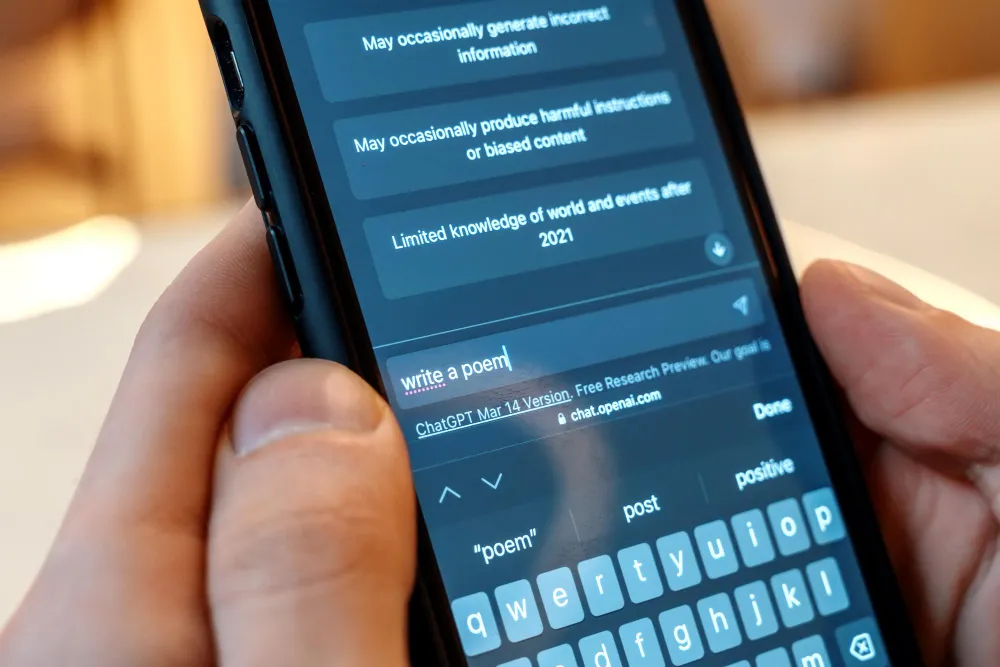For small business owners, every minute spent on operational tasks means less time to sell or serve customers.
Artificial intelligence (AI) has emerged as a powerful ally — it can eliminate steps, reduce errors, and free up your energy to focus on what really matters: growth.
What was once a technology reserved for big corporations is now accessible — both financially and practically — for anyone running a store, restaurant, or creative business.
This guide will show you how AI can improve your productivity by turning repetitive tasks into automated processes.
If you’re just getting started with AI, check out our beginner-friendly guide: AI for Small Businesses: How to Start Successfully.
With Kyte, you don’t have to write product descriptions — our AI does it for you. That means more time to focus on what matters most: making sales!
Get started nowGet started
What Is AI and How Can It Revolutionize Productivity?
Artificial intelligence is a set of methods that allows software to learn patterns from data, make decisions, and carry out tasks that once required human effort.
For small business owners, AI acts like a toolkit that works 24/7, doesn’t get tired, and scales with your business.
Chatbots, text assistants, demand forecasting systems, and predictive analytics dashboards replace time-consuming spreadsheets and hours of manual work — helping you respond faster and make data-driven decisions.
- Instant customer service: WhatsApp chatbots understand natural language, answer questions, schedule appointments, and share promotions. One study found that bakeries using chatbots saw up to a 70% reduction in unanswered messages.
- Content that sells: AI writers like ChatGPT can create product descriptions, emails, and social media posts in seconds — saving hours that would otherwise be spent writing manually.
- Accurate financial management: Machine learning algorithms forecast cash flow, identify peaks in late payments, and suggest price adjustments based on real sales data.
- Demand forecasting: Predictive systems analyze time series sales and external factors, helping you restock at the right time and avoid shortages or overstocking.
- Performance analysis: Smart dashboards bring together sales, marketing, and customer support metrics into visual reports that simplify decision-making — no tech skills needed.
These automations are just the beginning — if you want to see how AI can grow your profits, check out our guide: AI Tools for Sales.
How Can AI Boost Small Business Productivity?
Running your own business comes with daily challenges that shift depending on store traffic, seasonality, and customer expectations.
For entrepreneurs living this reality, AI offers a way to build custom solutions for each kind of pressure, making your business more agile and less vulnerable to surprises.
Virtual Assistants: Turning Time into Opportunity
In recent years, small businesses have started relying on virtual assistants that do much more than just answer questions.
Today, a system can recognize returning customers, suggest products based on past purchases, and even send follow-up messages automatically.
You can build custom service workflows, send appointment reminders, and collect reviews — all without stopping other tasks. This type of automation transforms customer relationships and keeps your schedule full, even when you're busy with suppliers or closing the cash register.
Customers notice the difference too: questions about store hours, payment options, or delivery details are answered in real time — even on weekends and holidays.
The result? Greater trust in your service, leading to positive social media reviews and more referrals.
Want to learn how to automate customer support with AI? Check out our article: AI Chatbots: Fast Customer Service for Small Businesses.
Smarter Efficiency and Cost Reduction Strategies
AI also shines when it comes to cutting hidden costs in your daily operations.
For example, AI-powered management systems can identify waste patterns in supplies and suggest inventory adjustments before items run out or get overstocked.
Image recognition tools automatically check the quality of received goods, helping you avoid losses due to damaged items.
Another big win is the ability to analyze your cash flow in real time and alert you to unexpected expenses — so you can act fast and avoid financial imbalance.
And with automated reports, it’s easy to compare performance across different time periods or promotional campaigns — no more wasting hours on spreadsheets.
AI in Everyday Retail: A Lighter, Smarter Routine
In retail, AI makes it possible to create personalized shopping experiences. Systems can recommend the right offers at the right time, based on customer history and inventory turnover.
Forecasting tools help you plan promotions for specific dates, spotting local trends without the need for manual research.
Integrations between sales platforms and management apps allow you to track orders placed via Instagram, WhatsApp, or in-store — all in a single dashboard.
This makes it easier to manage deliveries, improves communication between team and customer, and cuts down on delays. That way, entrepreneurs can test new products, adjust prices based on demand, and expand their sales channels without increasing their workload.

Top AI Tools for Small Businesses
In the world of small business, AI tools have gone from being a novelty to a must-have for productivity.
Instead of relying only on intuition or manual processes, business owners now have access to solutions that combine customer service, marketing, and management — no advanced tech skills needed.
Here are 10 AI tools that can help transform your day-to-day operations:
ChatGPT (OpenAI)
ChatGPT is a virtual AI assistant that helps small business owners save time every day.
It can write content, answer customer questions, generate campaign ideas, draft emails, and even assist in decision-making. It’s a versatile tool for anyone looking to boost productivity without needing a big team.
Gemini (Google)
Gemini is Google’s AI assistant, integrated with the Workspace ecosystem (Gmail, Docs, Sheets).
It helps small businesses with tasks like writing messages, building smart spreadsheets, and generating insights from data. It’s ideal for those already using Google tools who want to simplify admin and communication.
HubSpot
HubSpot is a full-featured CRM and marketing automation platform. With built-in AI, it helps entrepreneurs attract leads, manage contacts, and automate email and social media campaigns.
It’s especially useful for small businesses that want to level up their customer relationships and increase sales.
Whisk (Google)
Whisk is a Google AI tool that creates images based on text descriptions.
It’s a creative option for small businesses. Just type in what you need, and Whisk generates custom visuals — from illustrations to promotional graphics — ready to use.
Writesonic
Writesonic uses AI to generate marketing content, product descriptions, social media posts, and emails in seconds.
It’s a great pick for small business owners who don’t have time or a content team, but still want professional and creative communication.
Otter.ai
Otter.ai automatically transcribes meetings, audio, and video, making it easy for business owners to keep track of conversations with clients, suppliers, or teams without needing to take notes.
Perfect for anyone who hosts a lot of calls or training sessions and wants everything saved in text form and well-organized.

ElevenLabs
ElevenLabs is an AI tool that converts text into speech with impressive naturalness.
Small businesses can use it to create voiceovers for videos, ads, or voice assistants — no need to hire voice actors — making audio marketing more accessible and professional.
Predis.ai
Predis.ai generates ideas, captions, and images for social media posts. It’s perfect for entrepreneurs who want to stay active online but don’t have much time to plan or create content.
The tool analyzes trends and offers ready-to-publish post suggestions.
Canva
Canva is a favorite among non-designers who need to create professional-looking graphics.
With AI features, it suggests layouts, generates images, and automatically adjusts design elements. Great for small businesses that want to create attractive marketing materials quickly and easily.
Notion
Notion combines notes, tasks, and databases in one place. With AI support, it helps organize workflows, summarize content, and automate routine tasks.
Small business owners can use Notion to manage orders, marketing ideas, and operations effortlessly.
Kai (Kyte)
Kai is Kyte’s built-in AI assistant, created specifically to support small retailers.
It analyzes sales, inventory, and financial data, and offers practical recommendations to improve management and boost profits. It can also create attractive promotions, generate content for your social media, and even process audio files and documents for analysis.
With Kai, it’s like having a smart consultant built into your sales system.
Conclusion
Microbusinesses that invest in innovation are opening doors to new practices like algorithm-based digital loyalty programs, automated customer surveys, and real-time market trend analysis using live data.
In this context, artificial intelligence goes beyond automation — it becomes part of the creative and strategic process, helping entrepreneurs see new opportunities and make the most of every growth possibility.
Now’s the time to simplify your business routine with the latest tech. You don’t have to wait to see results — with the right tools, productivity rises, and your time goes a lot further.
Create your free Kyte account now and download the app.
👉 Frequently Asked Questions (FAQ)
1) How can AI help small business owners?
AI automates repetitive tasks, generates reports, and improves customer service — allowing you to focus on growing your business.
2) What AI tools help boost daily productivity?
ChatGPT, Gemini, Canva, Notion, and Kai (from Kyte) are some of the most helpful for automating content, design, management, and support.
3) Is AI expensive for small businesses?
No. Many tools offer free versions or affordable plans, so you can get started without big investments.
4) How can I use AI to save time in sales and marketing?
Use virtual assistants to handle customer messages and AI text generators to create campaigns and product descriptions automatically.
5) Does AI improve customer service?
Yes. Chatbots and auto-reply systems offer 24/7 support and can reduce unanswered messages by up to 70%.








